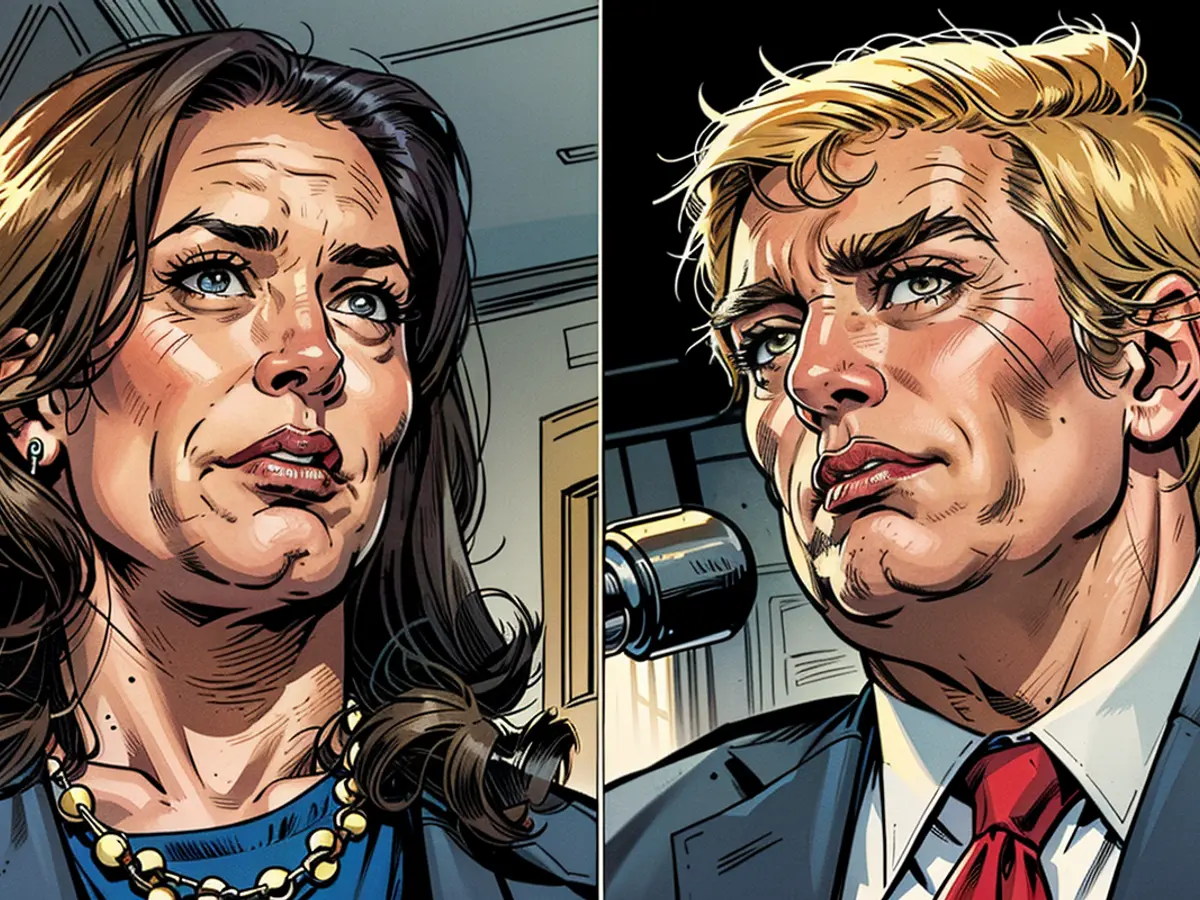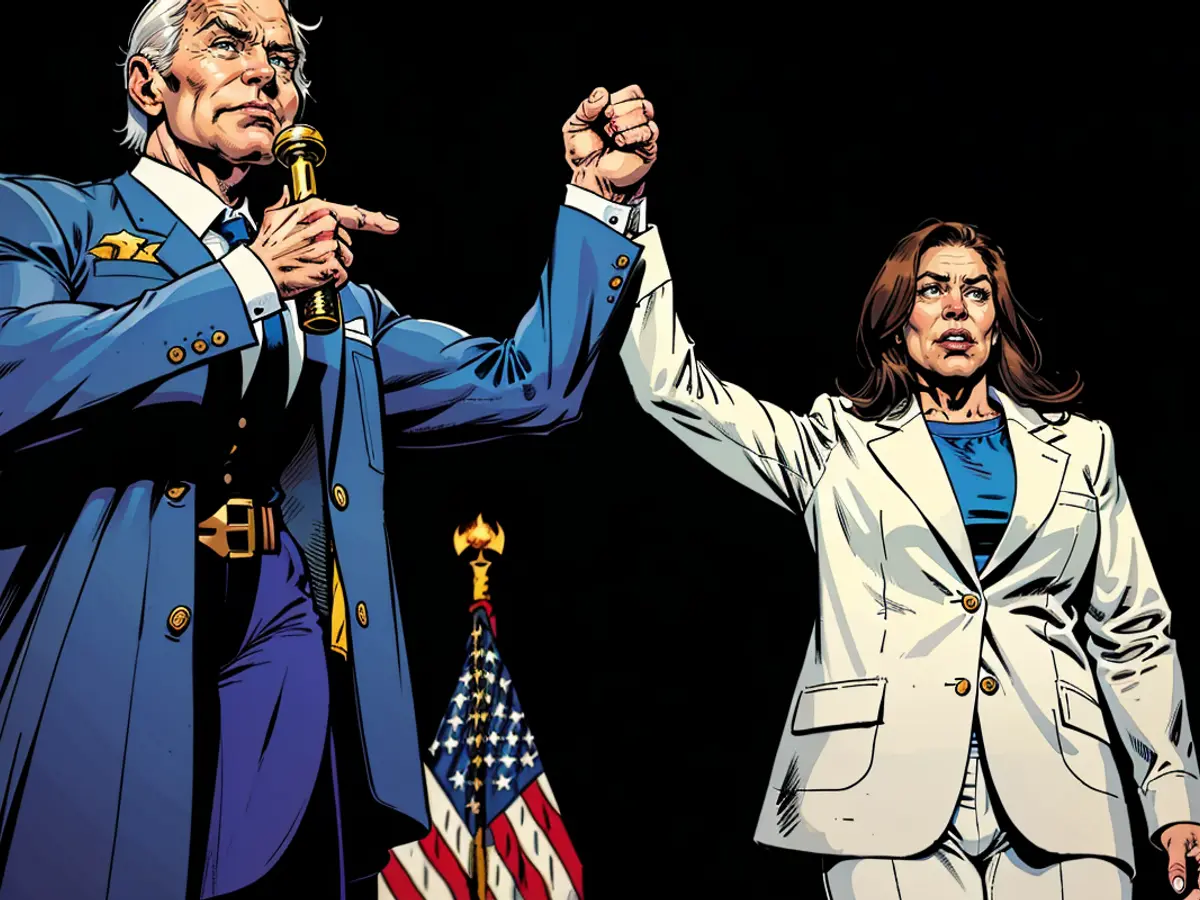Harris and Trump share a disdain towards inflation. Their economic strategies have the potential to elevate prices further.
Both Vice President Kamala Harris and ex-President Donald Trump have made commitments to reduce expenses. However, economists have raised concerns that the candidates' objectives, including Harris' economic policy announced last Friday and Trump's recent economic statements, might push prices up... and in Trump's case, potentially significantly so.
According to Joe Brusuelas, the chief economist at RSM US, both candidates' proposals would likely expand the deficit and stimulate demand, whether through government spending or tightening the labor market.
However, Brusuelas mentioned that Trump's plan presents more risks. "Both possible inflation and the risk of permanent higher inflation are greater with the Trump proposal," he said.
Digging Deeper into the Red
The Committee for a Responsible Federal Budget's analysis of Harris' "Agenda to Lower Costs for American Families" disclosed that her proposed policies could boost deficits by $1.7 trillion over a decade (potentially reaching $2 trillion if her housing policies become permanent). The main costs, amounting to $1.2 trillion, stem from Harris' proposed extension of the Child Tax Credit.
“I think it’s likely that both campaigns are going to be in the red (fiscally) for their proposals,” Marc Goldwein, senior vice president and senior policy director for the CRFB, told CNN. “Higher deficits in the near term mean more inflationary pressures, which either means people will see higher costs at the grocery store, the pump, in their houses, or the Federal Reserve will need to react by cutting rates more gradually.”
A separate analysis from the Tax Foundation projected that Harris' proposed tax subsidies and federal program expansions would likely surpass $2 trillion in costs over 10 years.
So far, Trump has not presented a comprehensive economic plan as detailed as Harris'. However, a previous CRFB analysis of Trump's proposal to eliminate taxes on Social Security benefits suggested the plan would cost between $1.6 trillion and $1.8 trillion through 2035.
The CRFB is planning a more comprehensive analysis of both campaigns' proposals in the coming weeks as more information becomes available.
The Dangers of Stimulating Demand
A key part of Harris' economic plan involves making housing more affordable. The plan, inspired by President Biden's proposals, includes building 3 million new housing units, offering down-payment assistance, and providing a tax credit for first-time homebuyers.
Economists told CNN that increasing supply would help alleviate the current housing market bottleneck and dampen price surges. However, they were more cautious about the stimulus efforts.
“The issue today is that too many people are chasing too few houses,” Justin Wolfers, a professor of public policy and economics at the University of Michigan, told CNN. “The solution is not to give people more money to buy houses.”
Another potential source of inflation could be an expanded Child Tax Credit, which would add more money to individuals' wallets. During the Covid-19 pandemic, the expanded Child Tax Credit aided families with child care costs and living expenses, keeping people in the workforce.
Michelle Holder, a labor economist and associate professor of economics at John Jay College in the City University of New York, posed a question about the amount required to expand the tax cut permanently. “On the other hand,” she said, “there’s a reasonable counter to that critique, which is this puts money in the hands of people who will spend it. Families with children face high expenses for child care... and making it more affordable for parents, particularly women, to work outside of the home.”
Economists have also raised concerns about Harris' proposal to impose a federal ban on price gouging, stating that such laws might motivate people to buy more goods than they would have otherwise.
Warnings of Reigniting Inflation
Trump has not released a detailed economic plan but has suggested several proposals, including raising tariffs on imported goods, extending his 2017 tax cuts, cutting the corporate tax rate further, cracking down on immigration and enacting “mass deportations,” and expanding drilling for domestic oil and energy.
In a June letter, 16 Nobel Prize-winning economists sent a stern warning that Trump's agenda – specifically, raising tariffs on China and international trading partners, extending the 2017 tax cuts, and cutting the corporate tax rate further – would not only "reignite inflation" but would have "a negative impact on the US' economic standing in the world and a destabilizing effect on the US' domestic economy."
Harris asserted on Friday that Trump's agenda, specifically the 20% tax on imports, would raise prices for a typical American family by $3,900 annually.
The figure of $3,900 brought up by Harris stemmed from the Center for American Progress Fund's progressive analysis. This organization looked into a potential 20% rise in import taxes, a topic Trump sometimes brings up during his rally speeches. Also, the Peterson Institute for International Economics conducted another study and estimated that these tariff proposals could cost a typical middle-income family around $1,700 annualy.
The Nobel laureate economists' correspondence failed to address Trump's immigration plans. Nevertheless, mainstream economists warned that Trump's goal of deporting approximately 15 to 20 million people, potentially with the aid of the National Guard, could lead to severe implications for the United States' labor market, which has been gradually recuperating following the employment challenges caused by the pandemic.
Economists talking to CNN suggested that companies would be compelled to boost wages and prices. Interestingly enough, they argued, an increase in immigration has aided the labor market recovery and has bolstered productivity, which in turn has helped in taming inflation.
CNN's Matt Egan and David Goldman played a role in compiling this report.
The business community might express concerns if the economic policies of Vice President Kamala Harris and former President Donald Trump significantly increase prices due to their proposals, potentially expanding deficits and stimulating demand in the economy. The Committee for a Responsible Federal Budget predicts that Harris' proposals could increase the deficit by up to $2 trillion over a decade, primarily through the extension of the Child Tax Credit.








